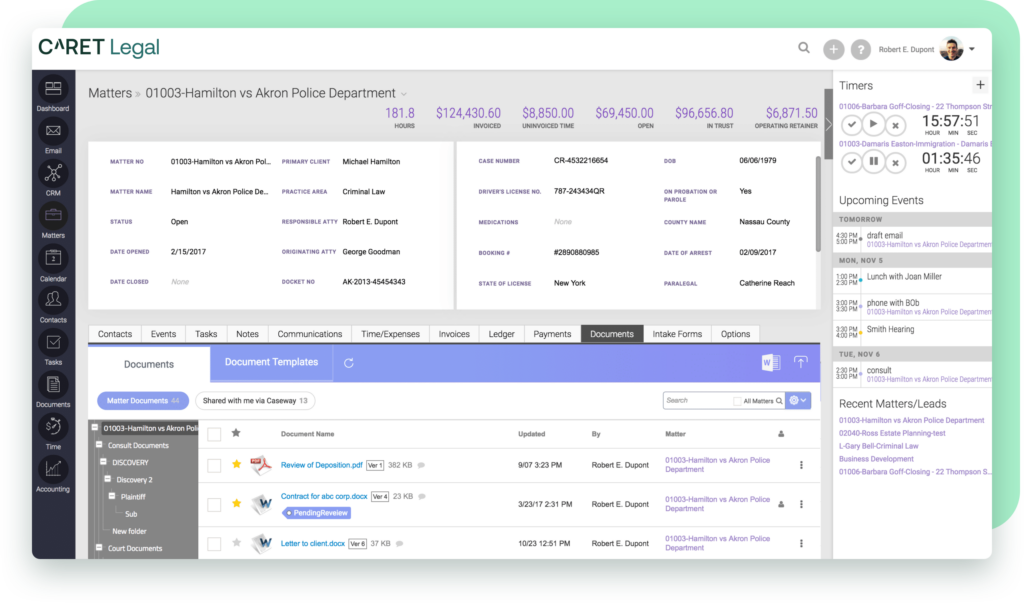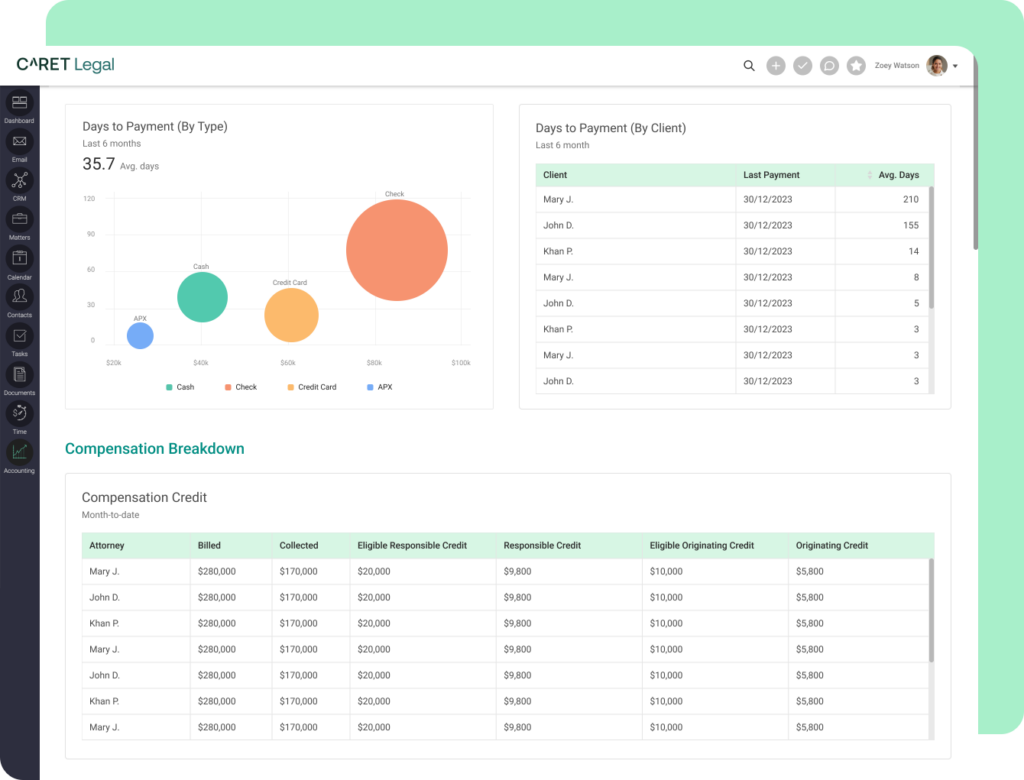By leveraging advanced features specific to the legal industry, law firms and arbitration centers can efficiently manage large caseloads while improving client outcomes.
Managing high-volume arbitration caseloads presents significant challenges, requiring the coordination of vast amounts of data, strict adherence to schedules, and clear communication among all parties. Legal practice management software (LPMS) offers an integrated solution designed to streamline these complex processes. By leveraging advanced features specific to the legal industry, such as those found in platforms like CARET Legal, law firms and arbitration centers can efficiently manage large caseloads while improving client outcomes. This blog will explore how these software features can enhance arbitration operations and offer best practices for implementing this powerful tool.
Features of Arbitration Software for High-Volume Caseloads
Advanced Case Management
Centralized case management is crucial for handling multiple arbitration cases efficiently. Arbitration software provides a centralized case database that allows legal teams to store, organize, and access vast amounts of case-related information from a single platform. This feature eliminates the need for disparate systems and reduces the risk of data loss, ensuring that all case documents and communications are consistently tracked and easily retrievable.
Software solutions also offer scheduling features that ensure key deadlines are met without the need for manual oversight. These tools track schedules and deadlines, sending alerts and reminders to keep the team on track. This automation reduces administrative burdens and ensures that no critical dates are missed, which is particularly beneficial in managing high-volume caseloads.

Document Management and Automation
Handling large volumes of documents is a common challenge in arbitration. Effective document management capabilities designed to address this high volume efficiently are a key feature of strong arbitration software. Software like CARET Legal supports document sorting, tagging, and retrieval, making it easy to manage and locate documents quickly. This feature is essential for maintaining organization and efficiency, especially when dealing with thousands of case files. Firms can also automate everyday documents to save your firm time, reduce errors and ensure consistency.
Additionally, a focus on secure data management is crucial to protect sensitive information. These platforms are typically equipped with robust encryption and security protocols to ensure compliance with data protection regulations. This not only safeguards client confidentiality but also supports the firm’s compliance with legal requirements, reducing the risk of data breaches and associated liabilities.
Collaboration and Communication Tools
Effective collaboration is key to successful arbitration, and many software platforms provide real-time collaboration tools that facilitate seamless communication among arbitrators, parties, and legal teams. These tools enable users to share information instantly, update case statuses, and coordinate efforts across different locations, ensuring that everyone is aligned and informed throughout the arbitration process.
Arbitration software also often includes dedicated client portals, which enable clients and legal staff to securely share documents, invoices and payments. Clients appreciate working with legal software providers who prioritize security because it gives them peace of mind knowing that their sensitive information is protected against data breaches and cyber attacks.
Benefits of Using Arbitration Software
Increased Efficiency and Productivity
By automating administrative functions like document management and case tracking with arbitration software, legal teams can focus on substantive legal work, improving productivity and case outcomes. The time saved through automation translates directly into cost savings and more effective use of resources.
Gaining insight into case trends and outcomes through data analytics tools ensures critical decisions are made based on real-time actionable data, not just speculation. The reporting tools embedded in many arbitration software analyze data across cases, identify common patterns, and inform decisions that lead to favorable resolutions in arbitration.

Improved Case Outcomes and Client Satisfaction
A key factor in gaining client satisfaction and trust is the speed at which arbitration cases are resolved. Arbitration software’s ability to automate and streamline every aspect of a case ensures that all tasks are completed efficiently, which not only speeds up the resolution process but also reduces costs associated with prolonged disputes.
Successful implementation of arbitration software requires a strong focus on change management and training.
Best Practices for Implementing Arbitration Software
Assessing Organizational Needs
Before implementing arbitration software, it’s essential to assess the unique needs of the firm to determine which features are most important. Some of these might include:
- Caseload Complexity: Assess the complexity and volume of cases the firm typically handles to determine if the software can efficiently manage and scale with high-volume and intricate cases.
- Integration with Existing Systems: Determine the need for the software to integrate with existing case management, billing, or document management systems already in use by the firm.
- Customization Needs: Identify whether the firm requires specific customizations, such as unique reporting formats or specialized workflow automation, to match its operational processes.
- User Access and Permissions: Evaluate the firm’s need for multi-level user access controls and permissions, particularly if the firm handles sensitive arbitration cases that require restricted access to certain documents or data.
- Regulatory Compliance Requirements: Consider the firm’s specific regulatory environment and ensure the software is equipped to meet all relevant compliance obligations, especially for firms operating across multiple jurisdictions.
When selecting the right software, it’s important to choose a solution that aligns with your organization’s goals and processes. Factors to consider include ease of use, integration capabilities with existing systems, and the ability to customize the software to meet specific needs.
Change Management and Training
Successful implementation of arbitration software requires a strong focus on change management and training. Ensuring that all users are comfortable with the new system is crucial for adoption. Comprehensive training programs that guide users through the software’s features and functionalities can help increase user adoption, as well as ongoing support to resolve any challenges encountered by users.
Enhancing Arbitration Efficiency with Advanced Legal Software
As the demand for efficient arbitration processes continues to grow, adopting advanced software solutions, such as those offered by platforms like CARET Legal, is essential for staying competitive and meeting client expectations. By implementing the right software, law firms can streamline their operations, reduce costs, and deliver better results for their clients.
Explore how CARET Legal can streamline your arbitration processes and drive better client outcomes. Start your free trial today!
